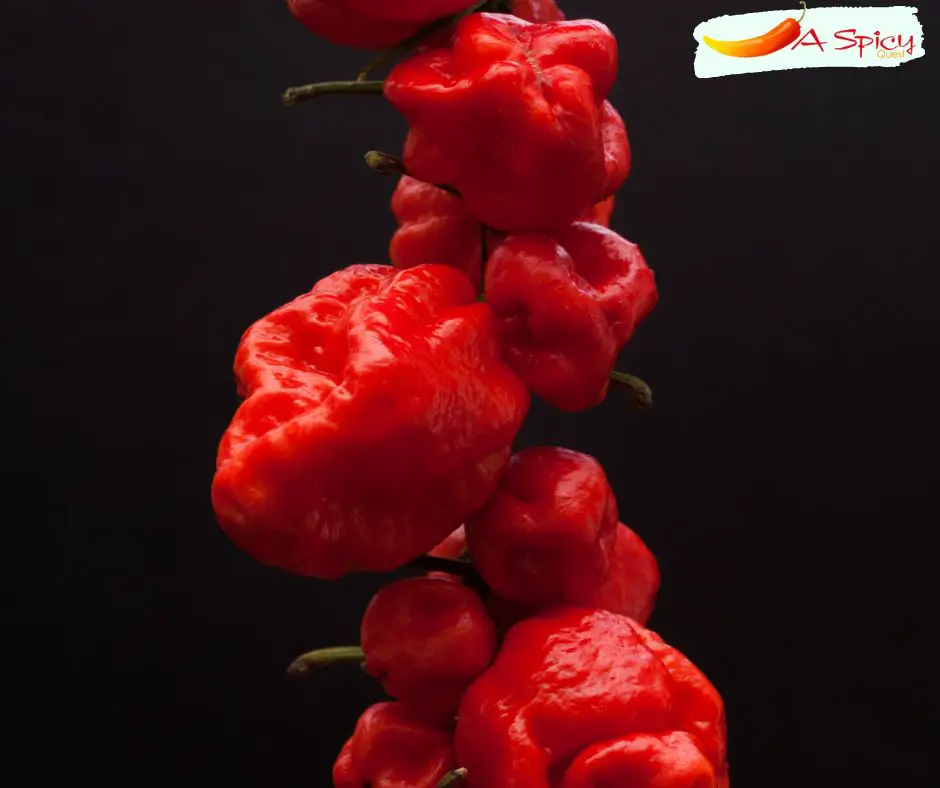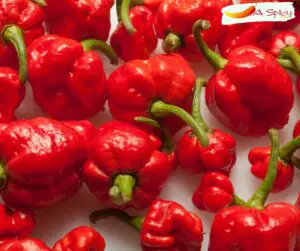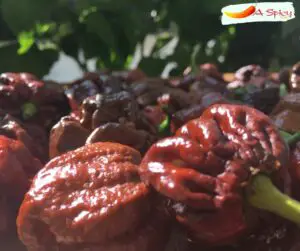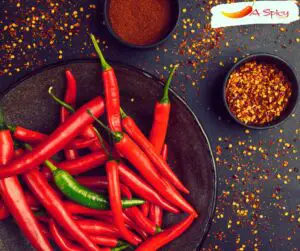
The Trinidad Moruga Scorpion pepper is one of the hottest peppers in the world. Do you love chilies? The Trinidad moruga scorpion is one of the hottest chilies in the world.
But how high is it on the Scoville scale, and what are some of its uses? This post will answer your questions and hopefully inspire you to try it out.
If you’re not used to eating spicy food, the Trinidad Moruga Scorpion pepper can be quite painful. Even if you are used to eating spicy food, the Trinidad Moruga Scorpion pepper can still be challenging. This is to tell you how spicy is the Trinidad Moruga scorpion pepper.
The Trinidad Moruga Scorpion Pepper is currently rated as one of the world’s spiciest chili at about 1.20 million Scoville Heat Units (SHU) on the Scoville scale.

The heat from this pepper can be intense and last for a long time. It is not for the faint of heart. If you enjoy spicy food, then this pepper is definitely worth trying. Just be sure to have some milk or water on hand to help cool your mouth if the heat gets too much.
The Trinidad Moruga Scorpion is described as having a fruity flavor with hints of chocolate and tobacco, making this pepper so unique among other super-hot peppers.
Tips for Growing Trinidad Moruga Scorpion Peppers
These are very easy-to-grow plants that can be easily grown indoors or outdoors. The plants will produce a lot of pods which you can use for cooking or preserving them. We have collected some useful tips for growing Trinidad Moruga Scorpion Peppers:
1. Plant your seeds early
You should plant your seeds early in the season when the soil is still cool.
If you don’t have a greenhouse or indoor space where you can keep them warm through winter, then place them under grow lights instead.
2. Choose the best location
The peppers need full sun and lots of heat to grow properly. If you live in an area below 85 degrees Fahrenheit, you will need to place the plant in a greenhouse or grow tent with supplemental lighting. The plant also needs good soil that drains well and plenty of water during its growing season.
Selecting a variety that is right for your climate is important. Some varieties are better suited to colder climates than others, so make sure you choose one that will grow well in your area before planting it.
3. Prepare the soil before planting the seedling
The ground should be tilled deeply, removing all weeds and rocks from the soil surface before planting. Spread a layer of compost over the tilled soil, then rake it into an even layer about three inches thick over the entire area where you plan to plant your peppers. Till again after adding compost so that it is worked into the top few inches of soil.
4. Use good quality potting mix
Use a high-quality potting mix that contains plenty of organic material, such as peat moss or composted bark mulch. This will help keep your soil healthy and give your plants the nutrients they need to grow well.
5. Place plants in full sun
These plants love lots of sun, so look for a spot that gets plenty of sunlight at least 6 hours per day without any shade trees or buildings blocking it out.
If you don’t have an area like this available, consider using artificial lighting during winter months when days are shorter, or move indoors.
6. Water them regularly
When it comes to growing Trinidad Moruga Scorpion Peppers, you want to make sure that you don’t water them too often but also that you don’t forget to water them at all.
You’ll want to ensure that it is not sitting in water but that there is plenty of moisture in the soil. These plants need more water than many other peppers, so keep an eye on them.
Watering your plants regularly is important because it keeps their roots happy and healthy so they can grow strong and tall.
7. Fertilize your plants
Your Plants: Fertilize your plants regularly with a high-nitrogen fertilizer like fish emulsion or compost tea. This will help them grow faster and produce more fruit for harvest later on.
Is It Safe to Eat a Trinidad Scorpion Pepper Raw?
If you can stand up to that kind of heat, then go ahead and eat it raw. But if you’re new to eating spicy foods, you may want to start with something milder like a jalapeno pepper or a serrano pepper first.
The Trinidad Scorpion has a taste that lingers long after the heat has subsided. It’s an acquired taste that some people love, and others hate.
If you like the taste of this pepper, then you’ll probably enjoy other peppers like habanero peppers and ghost peppers as well.
Side Effects from Eating Really Hot Peppers
The side effects of eating really hot peppers vary and depend on the type of pepper eaten and how much was consumed. Some common side effects include:
1. Stomach pain
Hot peppers contain capsaicin, which irritates the lining of your mouth and digestive tract. This can cause pain in your stomach and intestines.
Capsaicinoids stimulate pain receptors in the mouth, tongue, and stomach, causing them to release chemicals that make you feel hot and bothered. If you eat too many peppers, your stomach might experience diarrhea or vomiting because it’s trying to eliminate all those irritating chemicals.
2. Allergic reactions
Allergic reactions. Some people may develop an allergic reaction to eating hot peppers as they age or because they eat too many chilies at once (known as “chili phobia”).
Some people have allergies to capsaicinoids and other substances found in chili peppers that can cause hives, swelling, and difficulty breathing
3. Nausea and vomiting
Capsaicin triggers a fight-or-flight response in your body that causes gastric distress by increasing blood pressure and heart rate while decreasing blood flow to the digestive tract. The result? Nausea, vomiting, or both.
Conclusion
Ultimately, the Trinidad Moruga Scorpion pepper is one of the hottest peppers in the world. If you appreciate extreme heat, it is definitely something to try out.
Each pepper will vary in spiciness, depending on how hot the lot you purchase is. You may get lucky and get a mild heat or you may be unlucky and end up with a scorcher. But if you want a blazing hot pepper, the Trinidad Moruga Scorpion will certainly deliver.






